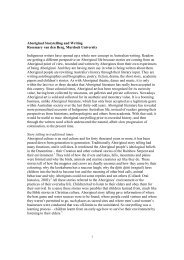Edward Koiki Mabo: The Journey to Native Title - [API] Network
Edward Koiki Mabo: The Journey to Native Title - [API] Network
Edward Koiki Mabo: The Journey to Native Title - [API] Network
You also want an ePaper? Increase the reach of your titles
YUMPU automatically turns print PDFs into web optimized ePapers that Google loves.
Noel Loos<br />
<strong>Mabo</strong> learned meeting procedures and gained experience at public speaking in what<br />
he would term ‘white-man culture’.<br />
It was also while <strong>Mabo</strong> was in western Queensland that he was first influenced<br />
by black activists such as Kath Walker (Oodgeroo Noonuccal) and Joe McGinness.<br />
When he returned <strong>to</strong> Townsville, he became involved with the Aboriginal advancement<br />
league and other Aboriginal and Torres Strait Islander organisations and held executive<br />
positions in most that he joined. 1967 was an important year for black Australians.<br />
<strong>The</strong>y now see it as the year in which they were at last acknowledged as Australian<br />
citizens. <strong>The</strong> referendum of that year changed the constitution <strong>to</strong> allow Aborigines<br />
<strong>to</strong> be counted in the census, from which they had been specifically excluded. And for<br />
the first time, the commonwealth government could legislate and set up administrative<br />
structures on their behalf. Previously, by the constitution, indigenous Australians<br />
had been a state responsibility except in the Northern Terri<strong>to</strong>ry.<br />
<strong>Mabo</strong> had been a member of the Aboriginal advancement league in Townsville<br />
since 1962 and involved in the campaign for the 1967 referendum. He wanted <strong>to</strong><br />
drive home the significance of these changes <strong>to</strong> the constitution and in July 1967<br />
suggested <strong>to</strong> local union leaders that a seminar be held, involving black and white<br />
north Queenslanders, <strong>to</strong> focus on the problems confronting indigenous Australians<br />
and consequently white Australians. <strong>The</strong> title, ‘We the Australians — What Is <strong>to</strong><br />
Follow the Referendum’ encapsulated the thrust of the conference, and the logo,<br />
two hands, one white, one black clasped in friendship, indicated the positive direction<br />
intended. It also reflected <strong>Mabo</strong>’s thinking: that it was necessary <strong>to</strong> work with<br />
supportive whites and through white processes and institutions <strong>to</strong> achieve black<br />
advancement.<br />
<strong>The</strong> inter-racial seminar identified three groups in which <strong>Mabo</strong> realised he could<br />
find allies: the trade union movement, academics from the newly established James<br />
Cook University College, and mainstream churches. <strong>Mabo</strong> deliberately set out <strong>to</strong><br />
strengthen his ties with people who had indicated their commitment <strong>to</strong> social justice,<br />
especially those from the first two groups with whom he felt especially comfortable.<br />
Even in this, his first major foray across the cultural divide, the Meriam battler<br />
found that he had stirred up a hornets’ nest of white reaction. It was decided locally<br />
that the Townsville branch of the one people of Australia league (OPAL) would host<br />
and advertise the conference as a number of members of the convening committee<br />
believed themselves, <strong>to</strong> be members of OPAL, the one multi-racial organisation in<br />
Queensland that was socially acceptable across the political spectrum and in the<br />
press. <strong>The</strong> federal council for the advancement of Aborigines, soon <strong>to</strong> be renamed<br />
the federal council for the advancement of Aborigines and Torres Strait Islanders<br />
(FCAATSI) on <strong>Mabo</strong>’s motion, was considered radical, even by some a communist<br />
front. A conservative anglican clergyman, the dean of the cathedral, the police special<br />
branch, and the ultra-conservative Queensland government decided that this conference<br />
was a dangerous communist front manipulating simple-minded blacks who were<br />
content with their existing lot, and set about demonising it. <strong>The</strong> Townsville clergy<br />
were advised by the dean not <strong>to</strong> participate in the inter-racial seminar. Some<br />
immediately withdrew, including all roman catholic nuns and priests. Others joined<br />
because they either thought the project was <strong>to</strong>o important <strong>to</strong> ignore or believed it<br />
should not be left in the hands of left-wing agita<strong>to</strong>rs. Others ignored the advice and<br />
112


![Edward Koiki Mabo: The Journey to Native Title - [API] Network](https://img.yumpu.com/33197148/5/500x640/edward-koiki-mabo-the-journey-to-native-title-api-network.jpg)
![Dream and Nightmare in William Gibson's ... - [API] Network](https://img.yumpu.com/49298598/1/184x260/dream-and-nightmare-in-william-gibsons-api-network.jpg?quality=85)

!['Fuck All Editors': The Ern Malley Affair and Gwen ... - [API] Network](https://img.yumpu.com/42446228/1/184x260/fuck-all-editors-the-ern-malley-affair-and-gwen-api-network.jpg?quality=85)
![Polona Petek - [API] Network](https://img.yumpu.com/40542952/1/190x245/polona-petek-api-network.jpg?quality=85)
![to download as a PDF. - [API] Network](https://img.yumpu.com/35170825/1/184x260/to-download-as-a-pdf-api-network.jpg?quality=85)
![Gallipoli, Kokoda and the Making of National Identity - [API] Network](https://img.yumpu.com/31766380/1/184x260/gallipoli-kokoda-and-the-making-of-national-identity-api-network.jpg?quality=85)
![Indigenous Knowledge and Pharmaceuticals - [API] Network](https://img.yumpu.com/24108846/1/184x260/indigenous-knowledge-and-pharmaceuticals-api-network.jpg?quality=85)
![Ferals: Terra-ism and Radical Ecologism in Australia - [API] Network](https://img.yumpu.com/13809010/1/184x260/ferals-terra-ism-and-radical-ecologism-in-australia-api-network.jpg?quality=85)
![Big Chief Little Wolf: Wrestling, Radio and Folklore in ... - [API] Network](https://img.yumpu.com/12204748/1/184x260/big-chief-little-wolf-wrestling-radio-and-folklore-in-api-network.jpg?quality=85)
![Dark Tourism and the Celebrity Prisoner - [API] Network](https://img.yumpu.com/4348795/1/184x260/dark-tourism-and-the-celebrity-prisoner-api-network.jpg?quality=85)